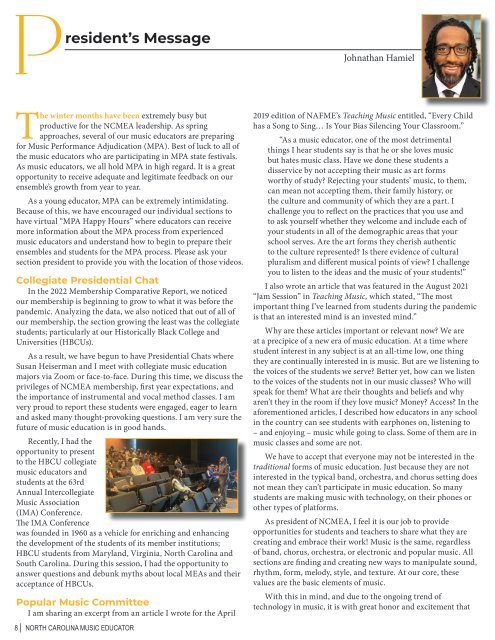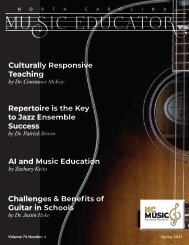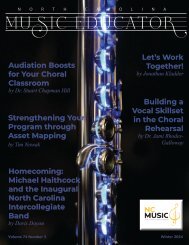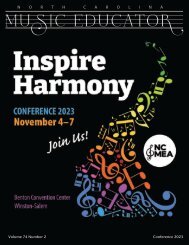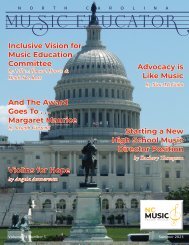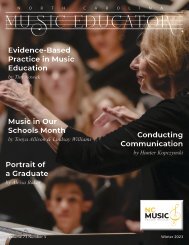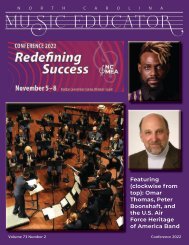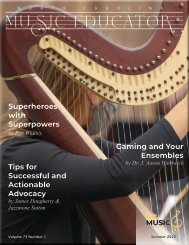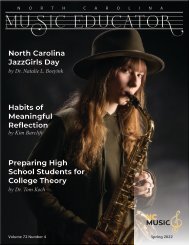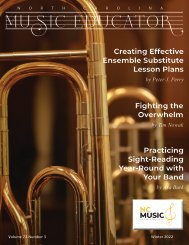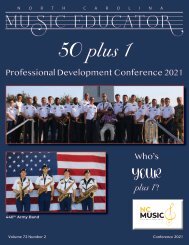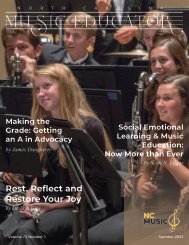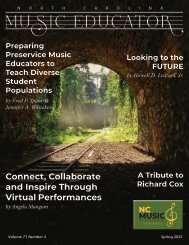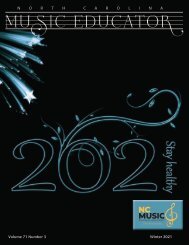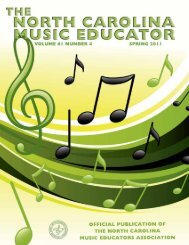Spring 2023
North Carolina Music Educator Journal Spring 2023
North Carolina Music Educator Journal Spring 2023
You also want an ePaper? Increase the reach of your titles
YUMPU automatically turns print PDFs into web optimized ePapers that Google loves.
President’s Message<br />
The winter months have been extremely busy but<br />
productive for the NCMEA leadership. As spring<br />
approaches, several of our music educators are preparing<br />
for Music Performance Adjudication (MPA). Best of luck to all of<br />
the music educators who are participating in MPA state festivals.<br />
As music educators, we all hold MPA in high regard. It is a great<br />
opportunity to receive adequate and legitimate feedback on our<br />
ensemble’s growth from year to year.<br />
As a young educator, MPA can be extremely intimidating.<br />
Because of this, we have encouraged our individual sections to<br />
have virtual “MPA Happy Hours” where educators can receive<br />
more information about the MPA process from experienced<br />
music educators and understand how to begin to prepare their<br />
ensembles and students for the MPA process. Please ask your<br />
section president to provide you with the location of those videos.<br />
Collegiate Presidential Chat<br />
In the 2022 Membership Comparative Report, we noticed<br />
our membership is beginning to grow to what it was before the<br />
pandemic. Analyzing the data, we also noticed that out of all of<br />
our membership, the section growing the least was the collegiate<br />
students; particularly at our Historically Black College and<br />
Universities (HBCUs).<br />
As a result, we have begun to have Presidential Chats where<br />
Susan Heiserman and I meet with collegiate music education<br />
majors via Zoom or face-to-face. During this time, we discuss the<br />
privileges of NCMEA membership, first year expectations, and<br />
the importance of instrumental and vocal method classes. I am<br />
very proud to report these students were engaged, eager to learn<br />
and asked many thought-provoking questions. I am very sure the<br />
future of music education is in good hands.<br />
Recently, I had the<br />
opportunity to present<br />
to the HBCU collegiate<br />
music educators and<br />
students at the 63rd<br />
Annual Intercollegiate<br />
Music Association<br />
(IMA) Conference.<br />
The IMA Conference<br />
was founded in 1960 as a vehicle for enriching and enhancing<br />
the development of the students of its member institutions;<br />
HBCU students from Maryland, Virginia, North Carolina and<br />
South Carolina. During this session, I had the opportunity to<br />
answer questions and debunk myths about local MEAs and their<br />
acceptance of HBCUs.<br />
Popular Music Committee<br />
I am sharing an excerpt from an article I wrote for the April<br />
Johnathan Hamiel<br />
2019 edition of NAFME’s Teaching Music entitled, “Every Child<br />
has a Song to Sing… Is Your Bias Silencing Your Classroom.”<br />
“As a music educator, one of the most detrimental<br />
things I hear students say is that he or she loves music<br />
but hates music class. Have we done these students a<br />
disservice by not accepting their music as art forms<br />
worthy of study? Rejecting your students’ music, to them,<br />
can mean not accepting them, their family history, or<br />
the culture and community of which they are a part. I<br />
challenge you to reflect on the practices that you use and<br />
to ask yourself whether they welcome and include each of<br />
your students in all of the demographic areas that your<br />
school serves. Are the art forms they cherish authentic<br />
to the culture represented? Is there evidence of cultural<br />
pluralism and different musical points of view? I challenge<br />
you to listen to the ideas and the music of your students!”<br />
I also wrote an article that was featured in the August 2021<br />
“Jam Session” in Teaching Music, which stated, “The most<br />
important thing I’ve learned from students during the pandemic<br />
is that an interested mind is an invested mind.”<br />
Why are these articles important or relevant now? We are<br />
at a precipice of a new era of music education. At a time where<br />
student interest in any subject is at an all-time low, one thing<br />
they are continually interested in is music. But are we listening to<br />
the voices of the students we serve? Better yet, how can we listen<br />
to the voices of the students not in our music classes? Who will<br />
speak for them? What are their thoughts and beliefs and why<br />
aren’t they in the room if they love music? Money? Access? In the<br />
aforementioned articles, I described how educators in any school<br />
in the country can see students with earphones on, listening to<br />
– and enjoying – music while going to class. Some of them are in<br />
music classes and some are not.<br />
We have to accept that everyone may not be interested in the<br />
traditional forms of music education. Just because they are not<br />
interested in the typical band, orchestra, and chorus setting does<br />
not mean they can’t participate in music education. So many<br />
students are making music with technology, on their phones or<br />
other types of platforms.<br />
As president of NCMEA, I feel it is our job to provide<br />
opportunities for students and teachers to share what they are<br />
creating and embrace their work! Music is the same, regardless<br />
of band, chorus, orchestra, or electronic and popular music. All<br />
sections are finding and creating new ways to manipulate sound,<br />
rhythm, form, melody, style, and texture. At our core, these<br />
values are the basic elements of music.<br />
With this in mind, and due to the ongoing trend of<br />
technology in music, it is with great honor and excitement that<br />
I would like to announce the formation of a new committee<br />
on the NCMEA Board of Directors! In January, the board<br />
voted unanimously to form a Popular Music Committee. This<br />
committee will be chaired by Dr. Jonathan Kladder, assistant<br />
professor of music education at UNC Wilmington. I am eager to<br />
see the positive impacts of this committee and how it brings more<br />
voices to our NCMEA table.<br />
Music in Our Schools<br />
Month<br />
It has been said, March enters in<br />
like a lion and goes out like a lamb.<br />
Well, the leadership of NCMEA have<br />
been ferocious when addressing our<br />
advocacy goals in music education.<br />
In March, we celebrate Music in<br />
Our Schools Month. For more<br />
than 30 years, March has been<br />
officially designated by the National<br />
Association for Music Education<br />
(NAfME) for the observance of<br />
Music in Our Schools Month®<br />
(MIOSM®), the time of year when<br />
music education becomes the focus of<br />
schools across the nation.<br />
In North Carolina, we had a<br />
series of performances across the<br />
state to celebrate MIOSM and bring<br />
awareness to our hard-working music<br />
educators, as well as highlight how<br />
music education changed our lives<br />
and the lives of our students. This<br />
year, we had a series of performances<br />
at NCDPI, which included:<br />
• March 9: Martin Middle School<br />
(Wake County), Allison Thomas,<br />
choral director<br />
• March 14: MScotland High Symphonic Band (Scotland<br />
County), Matthew Jorgensen, band director<br />
• March 16: W.J. Gurganus Elementary School (Craven<br />
County), Luana Palimetakis, music teacher<br />
• March 21: Walter Williams High School (Alamance County),<br />
Veronica Biscocho, orchestra director<br />
• March 22: Fox Road Elementary music students (Wake<br />
County, Monica Keele Jones, music teacher<br />
• March 29 (virtual): Nesbitt Discovery Academy (Buncombe<br />
County), Ben Sharp, orchestra director<br />
• March 23: W.B. Wicker Elementary School (Lee County),<br />
Hannah Kauffmann, music teacher<br />
NCDPI has been extremely supportive of music education.<br />
So much so that our State Superintendent Catherine Truitt has<br />
created a video to be shared with everyone about her story of<br />
going to a performing arts high school and playing piano as a<br />
child. She even mentioned her father, who is still a practicing<br />
music educator/band director at the age of 77. We look forward<br />
to collaborating with Superintendent Truitt and her goals as they<br />
pertain to the future of music education.<br />
We are very excited to bring you a new composition by Liz<br />
and Chris Betsch from Onslow County. If you perform this piece<br />
this year, don’t forget to add #MIOSM<strong>2023</strong> to all of your social<br />
posts and to send the composers an email to let them know how<br />
their music has reached our community. The new music is free<br />
to download at the NCMEA website<br />
under MIOSM.<br />
This year MIOSM is even more<br />
special to NC music educators<br />
because Governor Roy Cooper<br />
has proclaimed March Music in<br />
Our Schools Month. We are very<br />
appreciative of Governor Cooper<br />
and his office as he supports the<br />
music educators, music students and<br />
music education in the state of North<br />
Carolina.<br />
Upcoming Events/<br />
Webinars<br />
Guitar Literature – Guitar<br />
Method<br />
Books and<br />
Curriculum<br />
Resources<br />
Saturday, May<br />
20, 11a.m. –<br />
12p.m., ET<br />
There are<br />
dozens of guitar method books and<br />
resources available for teachers to use<br />
in their classrooms. But, which one<br />
would you pick? In this Zoom session,<br />
Chris Perez will discuss different method books available so you<br />
can tailor instruction to the needs of your guitar students and<br />
program. We will also review guitar method resources (scales,<br />
rhythms studies, warm-ups, solo/ensemble music and more) that<br />
may be immediately applied to your classroom teaching as well as<br />
the future.<br />
Listening To & Learning From Rural Music<br />
Educators<br />
Saturday, May 20, 9 – 11a.m., ET<br />
Music-teacher educators from UNC-Wilmington, East<br />
Carolina University, and Louisiana State University will facilitate<br />
a conversation to explore practical issues that K-12 music teachers<br />
face everyday. They will share findings from recent research<br />
as practical professional development, specifically designed<br />
to address the needs and guide next steps toward equity and<br />
excellence for rural music teachers and their students. If you are<br />
one of the many music educators in rural North Carolina, be sure<br />
to take advantage of this webinar for professional networking and<br />
learning opportunity!<br />
8 | NORTH CAROLINA MUSIC EDUCATOR NORTH CAROLINA MUSIC EDUCATOR | 9


